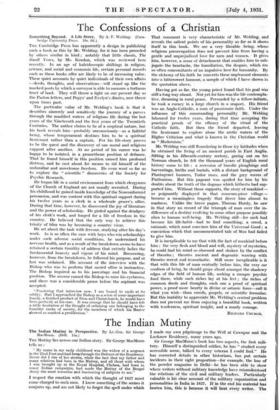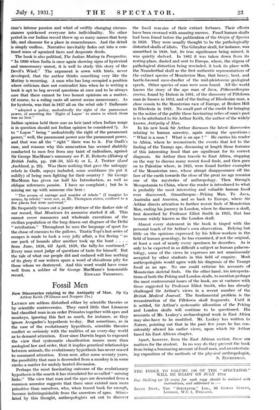The Indian Mutiny
The Indian Mutiny in Perspective. By Lt.-Gen. Sir Georgo MacMunn. (Bell. 15s.) Tun Mutiny lies across our Indian story. Sir George MacMunn tells us : "My nurse in my early childhood was the widow of a sergeant in the 32nd Foot and had been through the Defence of the Residency. Never did I tire of her stories, while the fact that rn.y father and many relatives had been in the Mutiny, and all those with whom I was brought up at the Royal Hospital, Chelsea, had been in many Indian campaigns, had made the Mutiny of the Bengal Army the most romantic and fascinating of subjects to me."
I respect the emotion with which the thought of 1857 must come charged to such men. I know something of the scenes it conjures up, and am not likely to forget the spell under which
I made my own pilgrimage to the Well at Cawnpur and the Lucknow Residency, many years ago.
Sir George MacMtmn's book has two aspects, the first mili- tary. Himself a distinguished soldier, he has "studied every accessible scene, talked to every veteran I could find." He has corrected details in other historians, has put certain incidents in their right proportion—for example, the loss of the powder magazine in Delhi—he has been able to show where writers without military knowledge have misunderstood the relations of the civil and military leaders. Particularly valuable is his dear account of the military organization and personalities in India in 1857. If in the end his material has beaten him, this is because it will beat every writer. The time's intense passion and whirl of swiftly changing circum- stances quickened everyone into individuality. No other period in our Indian record threw up so many names that keep life, and clamour for a place in remembrance. And the detail is simply endless. Narrative inevitably fades out into a con- fused mass of agonized faces and desperate deeds.
The book is also political, The Indian Mutiny in Perspective. " In 1930 when India is once again showing signs of hysterical and unnecessary unrest, it is well to study this story of the Devil's Wind." The argument is sown with hints, never developed, that the author thinks something very like the Mutiny is recurring. A man who has long occupied a position where criticism dare not contradict him when he is writing a book is apt to beg several questions at once and to be always sure that there cannot be two honest opinions on a matter. Of course, to a ruling caste all unrest seems unnecessary. As for hysteria, was that in 1857 all on the rebel side ? Dalhousie
"adopted a policy, undoubtedly the right of the paramount power, of asserting the Right of Lapse' to states in which there was no heir."
Indian opinion held there was an heir (and when Indian usage is in question should not Indian opinion be considered ?). As to " Lapse " being "undoubtedly the right of the paramount power," well, the paramount power was the paramount power, and that was all the " right " there was to it. For Oudh's case, and reasons why this annexation has seemed shabbily conducted to men free from any taint of radicalism, against Sir George MacMunn's summary see P. E. Roberts (History of British India, pp. 248-50, 355-6) or L. J. Trotter (Lord Auckland, p. 29). Was there nothing that gave the unhappy rebels in Oudh, sepoys included, some semblance (to put it mildly) of being men fighting for their country ? Sir George MacMunn has given me half his Introduction, as well as oblique references passim. I have no complaint ; but he is mixing me up with someone else here :
"The scenes of outrage and murder of rebels" (I imagine he means, by rebels) "were not, as Mr. Thompson states, confined to a few places but were universal."
He frequently tosses out a jaunty defence of the darker side of our record, that Messieurs les assassins started it all. This cannot cover massacres and wholesale executions of the civilian population or the long drawn out disgrace of the Delhi "retribution." Throughout he uses the language of sport for the chase of enemies to the gallows. Tantia Topi's last series of escapes is made to look a very jolly affair, a fox fleeing "as one pack of hounds after another took up the hunt . . . . from June, 1858, till April, 1859, the tally-ho continued." Every man must judge of questions of taste for himself. But the tale of what our people did and endured will lose nothing of its glory if our writers spare a word of chivalrous pity for those whom we destroyed. And this word would have come well from a soldier of Sir George MacMunn's honourable











































 Previous page
Previous page